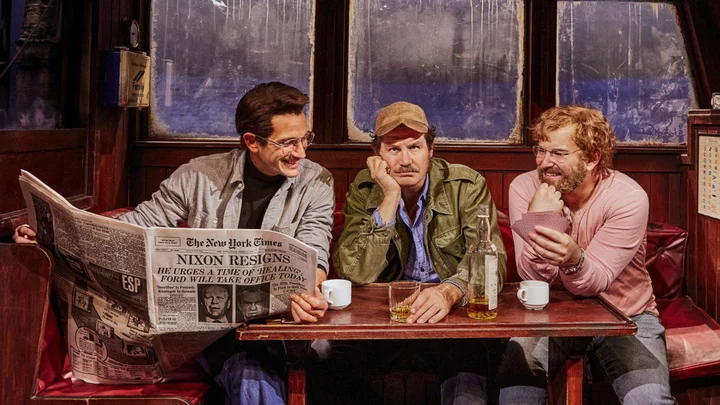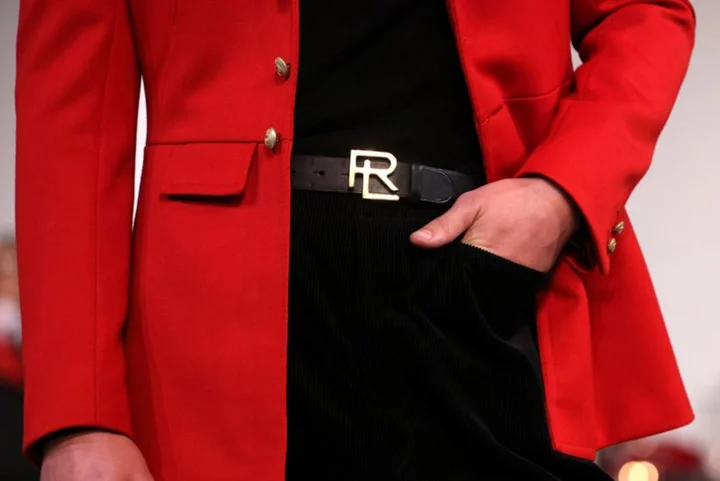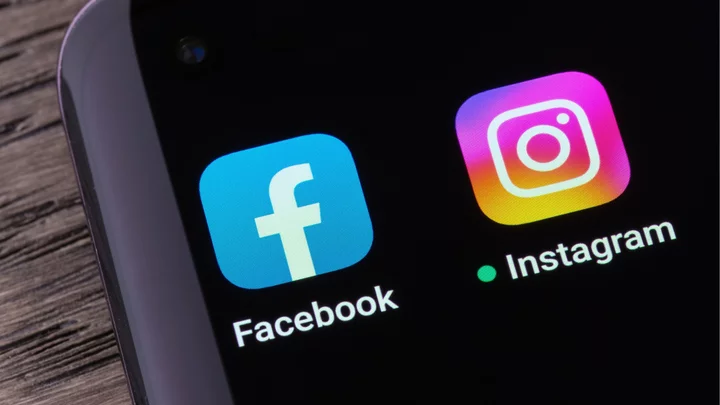On its surface, Jaws is about a killer shark terrorizing a beach town at the peak of tourist season. But behind the iconic monster, its chilling score, and nightmarish violence, Steven Spielberg was making a movie about masculinity. Each of his three leading heroes — the fearful Sheriff Brody (Roy Scheider), the erudite diver Hooper (Richard Dreyfuss), and the bullying captain Quint (Robert Shaw) — is pitted against a primal force determined to sink them. The man who saves the day won't be the toughest or the smartest, but instead the father who balances protecting his beaches and bonding with his son.
Incredibly, The Shark Is Broken aspires to similar depths despite its comedic trappings. On its surface, the 95-minute play is about the frustrations, petty rivalries, and not-so-secret vices that Scheider, Dreyfuss, and Shaw may have gotten up to while waiting for cameras to roll on Jaws. But in between jokes, fan service, and some tasty movie trivia, a story of fathers, sons, mortality, and legacy begins to rise. Fittingly, the late Robert Shaw's son Ian Shaw, who visited the Jaws set when he was just a child, is the play's co-writer and co-star. He nimbly steps into the soggy shoes of his father, lending an undercurrent of poignancy to the broader comedic strokes.
SEE ALSO: Josh Groban's 'Sweeney Todd' Broadway revival shocks and awesWhat's The Shark Is Broken about?
Credit: Matthew MurphyBefore Jaws was a blockbuster, much less a cultural phenomenon that spurred a tidal wave of sequels and shark-infested imitators, as well as a sea change in Hollywood that would lean more and more into franchises, it was a monster movie that seemed destined for disaster. Up-and-coming director Steven Spielberg may well have feared mutiny; the crew grew frustrated with the production delays caused by pesky locals, disruptive boats, and a glitchy mechanical shark that gobbled up time, money, and patience.
In The Shark Is Broken, Spielberg is reduced to a disembodied voice who occasionally calls out a direction from offstage. Onstage sits a reproduction of Quint's boat, the Orca. Cut in half lengthwise (think The Life Aquatic of Steve Zissou), it's set in front of a projection screen showing videos of waves undulating under a sky that's sometimes peppered with soaring seagulls, sometimes flecked with stars. In the ship's cramped quarters, three actors prepping to film what will become a legacy-defining movie for each of them are on the brink of going overboard.
Roy (Colin Donnell) enters first; he's lean and tan and as calm as the waters rippling behind him. Next, Richard (Alex Brightman) rumbles in like a thunderstorm, all bearded, bespectacled, and bundled up.
SEE ALSO: 'Meg 2: The Trench' review: Ben Wheatley hates youThe two are an instant study in contrasts. Roy refuses to be bothered by the things he cannot control, casually turning his attention to a newspaper, while Richard is desperate for indulgence, be it the warmth of a space heater or the validation that he'd be a natural at some of Shakespeare's greatest roles. As the play's dialogue will spell out for the audience, Roy is riding the wave of an already-storied career that includes an Oscar nod for 1971's The French Connection. Richard is starting out, and desperately terrified of stalling out. Then, in strides Robert.
Much like in Jaws, his presence (or, in this case, his son's) carries a regal bravado with a blue-collared gruffness. It's known that Shaw and Dreyfuss loathed each other in real life, and The Shark Is Broken doesn't shy away from their battling. Right away, the established British theater actor and playwright delivers barbs that aren't just cutting but deliver veritable body blows to the New York City actor with a chip on his shoulder the size of the Empire State Building.
At first, I feared Ian Shaw and his co-writer Joseph Nixon would paint the former's father as a noble knight who employed his brutal wit to defend his beloved craft. But while Robert begins as brusque yet lovable — like Quint — the long days and longer nights press him to places that are darker, more dangerous, and surprisingly vulnerable.
Ian Shaw is haunting as Robert Shaw.
Credit: Matthew MurphyThis casting risks being a gimmick in The Shark Is Broken. Ian Shaw originated the role of Robert out of the 2019 Edinburgh Fringe, then reprised the part in the show's West End and Toronto runs, right onto Broadway. It's undeniable that an element of the thrill of seeing him onstage, replicating his father's famous character while wearing the familiar third-act costume from Jaws, is that Ian is near the spitting image of Robert Shaw. It's almost eerie, especially as the character pontificates on mortality. Truly, I'd be curious to see how the show plays with an understudy who doesn't share the family's distinctive knobby mug.
While cynics might sneer "nepo baby," Ian astonishingly captures the charisma of his father. Of course, he compellingly reenact some of Jaws's most-famous bits — like the singing of "Spanish Ladies" and the incredible USS Indianapolis speech, which the senior Shaw had a hand in writing — but he also plays him as a growling bastard who lays into the neurotic Richard with wicked glee. The challenge then for Donnell and Brightman (who joined the play in its Broadway incarnation) is to match Shaw despite his inherent advantages.
Alex Brightman is electrifying as Richard Dreyfuss.
Credit: Matthew MurphyThe Broadway star, who previously headlined two previous movie-to-stage translations (School of Rock and Beetlejuice the Musical), is perfectly cast as a young Dreyfuss. His energy is not only sparking but volatile. Immediately, he evokes the urgency Dreyfuss brought to the Cassandra-like role of Hooper. Yet, I was reminded more often of the actor's Oscar-winning turn in Neil Simon's The Goodbye Girl (1977), where Dreyfuss played a self-obsessed actor terrified of ruining his career before it even begins. If that is where Brightman was pulling influence from, it's a wise move. After all, The Shark Is Broken is a comedy.
SEE ALSO: What that movie reference in 'The Last of Us' episode 6 means for Joel and EllieBrightman throws himself into the humor without ego, whether asked to perform an act of physical humiliation, unchecked arrogance, or uncontrollable self-loathing. He is a force of nature on that stage, hemmed in by the claustrophobic Orca set, threatening to rip it to shreds — if Shaw doesn't first. Together, Ian Shaw and Alex Brightman are like prize fighters, facing off with pride on the line and a growing need to land a knockout. The script smartly plays them as opponents, not just on set but in the future of cinema itself.
While Robert speaks passionately about theater and his writing, pondering how his work might be remembered, Richard openly yearns for fame and fortune, things Robert not only takes for granted but proudly disdains. They are looking at each other from the opposite ends of their respective journeys. To Richard, Robert is a grousing gatekeeper. To Robert, Richard is a neurotic upstart and a worrisome omen for the evolution of movie stars. In this battle, no winner will be declared outright; the audience is dared to make their own call.
Colin Donnell is slyly solid as Roy Scheider.
Credit: Matthew MurphyAs Roy, Donnell has the least flashy role. While Richard and Robert get into screaming matches and twitch with their respective dependencies on drugs and alcohol, Roy's vice is smoking and sunbathing, which seem almost cute in comparison. Donnell is tasked with playing the straight man to Brightman's boorish clown and Shaw's sophisticated tyrant. The actor has a pleasing breeziness, though at times his approach can feel a bit broad next to the grit and glowering of his partners.
The writers try to bolster this potentially thankless role with a solo scene, in which audiences are invited into a private moment that showcases the simple pleasures and hidden rage of the Orca's chillest castmate. However, the scene flirts with indulgence, going on long enough to try an audience's patience and being buttoned with a bit that creaks into cliche. Donnell is at his best in the thick of it, when the three men are comparing their scars — not the physical marks on their bodies but the father-son traumas they carry inside.
The Shark Is Broken is a story of fathers and sons.
Credit: Matthew MurphyMirroring Jaws, only one of the three characters is established as a dad. Robert speaks of his nine children, reflecting on how his own father died before he could really get to know him. If you know that Robert Shaw died just four years after Jaws was made, watching his son speak about the wish to reach out to your dad and comfort him hits all the harder.
The Shark Is Broken lays bare sons sharing stories of the fathers who failed them. In the wake of this, the audience is pushed to reflect on how one generation informs who the next would become. As in Jaws, the central trio presents colliding concepts of masculinity. Robert is the intimidating intellect who insists he is "the grit in the oyster that produces the pearl." Richard is a charismatic ladies' man who talks big and brash but also fears he's not enough. Roy, with the calm of a monk and a cigarette dangling from his lip, offers a cool spin on machismo, unbothered and radiant, but with an undercurrent of anger he dare not acknowledge.
The Sharks Is Broken is at its best when these three are in conflict or when they're clattering unexpectedly into clamoring camaraderie, such as singing a shanty like in Jaws. Set solely and sharply on the Orca and with no intermission to ruin the flow, the play keeps terrific tension, even as light changes shift us to a new time and a fresh scene. Where this ship-set story wobbles is cheap jokes that look to the future to snark at the past. For instance, a smug Roy remarks of Nixon, "There will never be a more immoral president," and Robert laments a future for cinema that might boast sequels, and remakes, and sequels of remakes. Admittedly, these jokes play well to the Broadway crowd — something I can attest to, having seen the reaction in previews. But they are clunky and cheap next to such sensational character-building and meta-reflection.
Yet, for these bumps along the way, The Shark Is Broken is a sensational night at the theater, especially if you're a Jaws fan. The play welcomes you into the familiar, peppering in bits of thrilling movie trivia amid the quarreling. And while the conversations here are imagined, they scratch at the uncomfortable truths of what we pass on, long after we've passed on.
The Shark is Open begins a 16-week engagement on Broadway on Aug. 10.









